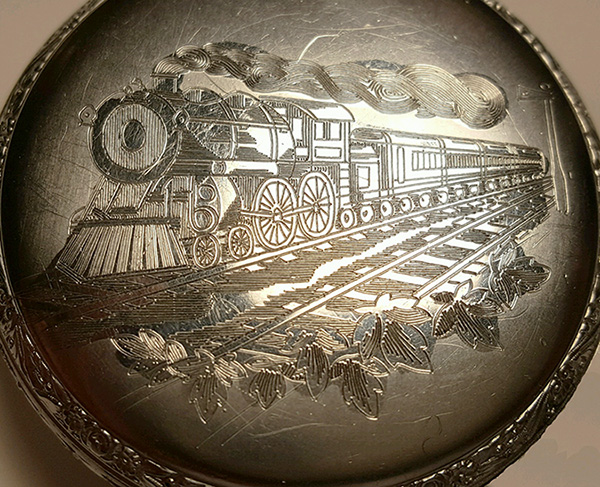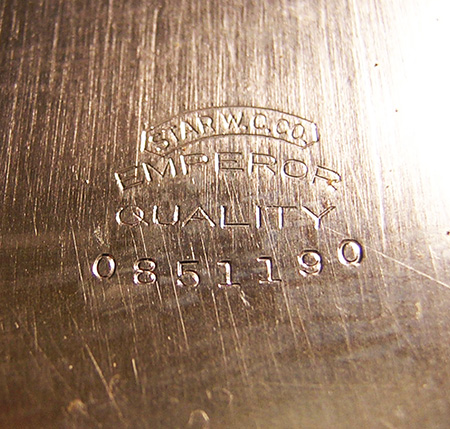
| WWT Shows | CLICK TO: Join and Support Internet Horology Club 185™ | IHC185™ Forums |

|
• Check Out Our... • • TWO Book Offer! • |
Welcome Aboard IHC185™  Internet Horology Club 185
Internet Horology Club 185  IHC185™ Discussion Site Main Page
IHC185™ Discussion Site Main Page  Horological Discussions, Questions and Answers
Horological Discussions, Questions and Answers  Pocket Watch Discussions
Pocket Watch Discussions  1903 Waltham w/Train Engraving on Case
1903 Waltham w/Train Engraving on Case
 Internet Horology Club 185
Internet Horology Club 185  IHC185™ Discussion Site Main Page
IHC185™ Discussion Site Main Page  Horological Discussions, Questions and Answers
Horological Discussions, Questions and Answers  Pocket Watch Discussions
Pocket Watch Discussions  1903 Waltham w/Train Engraving on Case
1903 Waltham w/Train Engraving on CaseGo  | New Topic  | Find-Or-Search  | Notify  | Tools  | Reply to Post  |  |
Greetings again everyone. I'm back again with what will probably be my last new purchase until I sell some things! This just arrived today. The auction only had a picture of the front and back with no other information. I took a leap and this is what I got. If my real quick research is correct, I believe it's a 16s Waltham from around 1903. As always, any thoughts or comments are appreciated. The first picture is of the front. I didn't get the crystal off until after the pics were taken. Crystal is plastic and the dial looks to be painted metal.  | |||
|
Here is the movement. Serial # is 12880895.  | ||||
|
Here's what really sold me. I had no clue what the case was, but the train looked amazing.  | ||||
|
Inside case. The very bottom of the case actually says the words "Base Metal" with a tiny, little star beside it.  | ||||
|
Overall, it appears to be in pretty good shape. There are a few scratches on the back and the bow has fallen off a couple of times, but overall, I'm pretty pleased. As I said, any and all thoughts are completely appreciated. Happy Wednesday! Ed | ||||
|
Here's my take, for what it's worth. The case and movement both look good but obviously don't go together. If it was mine, I would look for a nice, high pendant, Hunter case for the movement and use your case on an open face movement dating from no earlier than 1925. I like that case even if it is base metal. | ||||
|
| IHC Member 1291 |
You can't come out by upgrading to a proper H/C. It looks nice, if it runs and keeps close time, I would change the crystal, tighten the bow, and use it for a everyday knock about carry watch. regards, bb | |||
|
Thanks guys. So this is where I show my novice-ness! Silly me, I just always assume that the case and watch were meant to be paired up. How can you tell that they don't go together? If I took a guess, I'm betting the case dates to after the manufacture of the watch. I've tried to find case number serial number sites to check out case mfg. dates, but I haven't found any. And Donald, I do agree. The case is really nice. Even better now that I finally have it! Thanks again. | ||||
|
| IHC Member 1291 |
The main thing you see here is the fact that someone has put a H/C movement in a case that was made for an open face movement thereby creating the mismatch/hodgepodge/crossbreed, of what today is called a "sidewinder" because it winds at the 3 o'clock position. The pendant urn cases were for the earlier watch movements such as yours. Around the early 1920's the urn went away and the crown sits right atop the mid section of the case. It was the wave of the future. regards, bb | |||
|
I do not see any other screw marks on that case perhaps that how the original owner like the watch to be in open case. | ||||
|
That case would not have been the original since it dates from at least 20 years after the watch was made. It may however be a replacement for a worn out hunter case and may not have ever held any other movement. Sadly, it could also be a replacement for a melted down Hunter case. Hunter cases have more gold in them than open face and I suspect that case scrapping of hunters is the main reason we see so many "sidewinders" today. Personally, I cringe when I see one. They just don't look right to me. That case would be great for an open face movement and especially for a RR grade one. Another point is this. I have cases that I have personally switched movements in and out of. One has held at least 4 different movements. None of the movements left any kind of screw marks behind. | ||||
|
good point Donald. | ||||
|
Thanks for all the comments gentlemen. While I must admit that I'm a little disappointed, I really can't complain. I took a gamble on some fuzzy pictures and it isn't like I blew a ton of money on the purchase. Now I just have to decide whether to just add it to my small but improving collection as is or start looking for RR grade watch for the case. Which does lead to another question or two. First, with cases like this, is there an easy way to determine time frames of manufacture? And second, since we know this watch isn't original to the case, is there concern about finding a watch that "should" or could match the time period of the case or does that matter? Thanks again guys! Ed | ||||
|
| IHC Member 1291 |
THe case in question is actually a model made around 1960 for people looking for a cheap base metal case as good cases were beginning to be scarce in the marketplace. It's not a case you would want to put a significant movement in. It's inexpensive, looks good, and serves a purpose today. regards, bb | |||
|
| IHC President Life Member |
Agreeing and adding another point or two... The metal dial we see here was repainted circa the 1930s going by the style of numerals. We should also note that painted plain metal dials such as this one first came into use around the 1910-1912 era with the advent of 12-size movements. Metal dials allowed a thinner case which became very popular in the years that followed. Waltham dials in Porcelain-Enamel such as originally came on this movement are readily available as many thousands of Walthams have been scrapped for repair parts. Locating a correct case from the early years of the 20th Century is doable when justified. (See below) With so many cases being scrapped, in the 1930s then the 1980s and more recently when gold values hit record highs we lost a lot of Horological History to the greed of watch scrappers. I have long predicted that one day our hobby may be reduced to two or three main levels, consisting of near-pristine original-appearing examples at the top (crowned by documented originals) then worn, often put-together left-overs such as the subject of this topic and various others descending through "carry watches" all the way down to "parts watches" at the bottom of a veritable food chain, like... "Survival of the fittest" ...in the animal kingdom. Recognizing these points are important in collecting as already only top condition examples command high prices and the gaps between the various levels of condition and originality continue to widen. "And the Beat Goes On" Lindell | |||
|
And this is why I love this site! You guys are all awesome. I've learned way more on this thread than I ever expected. I may have a Frankenwatch, but I didn't go overboard on the purchase. I have a pretty cool looking case and I've learned a few things. All in all, I'd say that's a pretty good investment! Thanks again for all the input! Ed | ||||
|
You can tell something about the year a case was made by it's design. A 16s case with a long neck pendant could be from the 1890's up to about 1920. Shorter pendants came into vogue in the 20's and by the 30's, many cases had practically no pendant to speak of with the winding crown on or nearly on the top edge of the case. As has been said, the case you have, while very nice, was made as a low cost replacement for a worn out case and could contain nearly any movement that would fit in it. Nearly any 16s open face movement would be okay in it for a daily use watch. I just mentioned a Railroad grade one because of the train on the back. If having the watch wind from the side (the 3 o'clock position) doesn't bother you, then leave it as it is and enjoy it. It's still a nice watch. I have a base metal "Defiance" case that looks like white gold and has housed a couple of movements until I could find a gold filled one that the watch could have originally come in. It's a fine looking case and any watch looks very good in it. One really good thing about such cases is that they will almost never wear out. | ||||
|
| Powered by Social Strata |
| Your request is being processed... |
|
Welcome Aboard IHC185™  Internet Horology Club 185
Internet Horology Club 185  IHC185™ Discussion Site Main Page
IHC185™ Discussion Site Main Page  Horological Discussions, Questions and Answers
Horological Discussions, Questions and Answers  Pocket Watch Discussions
Pocket Watch Discussions  1903 Waltham w/Train Engraving on Case
1903 Waltham w/Train Engraving on Case
 Internet Horology Club 185
Internet Horology Club 185  IHC185™ Discussion Site Main Page
IHC185™ Discussion Site Main Page  Horological Discussions, Questions and Answers
Horological Discussions, Questions and Answers  Pocket Watch Discussions
Pocket Watch Discussions  1903 Waltham w/Train Engraving on Case
1903 Waltham w/Train Engraving on Case©2002-2025 Internet Horology Club 185™ - Lindell V. Riddle President - All Rights Reserved Worldwide

